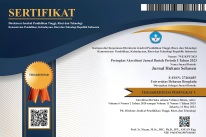Judges' Legal Considerations Obstacles Of Justice By Advocates Make It Difficult In Investigations, Prosecutions And Judicial Processes Against Defendants In Corruption Crimes
Abstract
The aim of this research is to analyze law enforcement related to obstruction of justice and juridical responsibility if lawyers (advocates) deliberately obstruct investigations, investigations and prosecution processes: The method of this research is normative legal research with an approach used by regulations (laws). Statutory Approach), Case Approach. Analysis of legal materials uses qualitative analysis and deductive conclusion drawing. Research Results Factors that influence law enforcement related to obstacles to justice in prosecution for criminal acts of corruption include: The legal substance factor, namely that Article 21 of the Corruption Eradication Law does not clearly regulate prohibited acts. Article 21 only states "intentionally preventing, obstructing or thwarting". This creates uncertainty regarding what actions are intended to prevent, hinder or thwart. The position and function of an advocate is equal to that of clients and other law enforcers, so that advocates participate in enforcing the law professionally based on justice and truth. The function of an advocate is to accompany clients starting from the process at the initial level of providing legal advice, as well as everything related to the client's interests in order to obtain opportunities and equality. rights before the law, duties and responsibilities of advocates.
Downloads
Copyright (c) 2024 M Ridwan, Saut Parulian Panjaitan, Ruben Achmad

This work is licensed under a Creative Commons Attribution-ShareAlike 4.0 International License.






